- Home
- Chuck Wendig
Wanderers Page 3
Wanderers Read online
Page 3
“Don’t you have your cell?”
“I left it back in the stable.” Of course he did. One of his bad habits, that. Damnit, Dad.
“It’ll be fastest to get it and call,” she said.
“Yeah, okay. Yeah.” He reached in his pocket for the keys, then hurried forward to Nessie. He said something to her, something Shana couldn’t hear, and kissed the younger girl on the cheek.
Nessie, unfazed, continued her journey. Feet slapping on wet road.
Shana saw someone else, now: A man, tall and lean, stepped out of the mist and onto the road. Over a hawk’s-beak nose rested a pair of round spectacles, and Shana realized: I know him.
“Dad, Dad, look.” She waved her hand in the air. “Mister Blamire, hey, over here.” Mister Blamire was her geometry teacher. Shana sucked at math, but Blamire had always been patient, even helped her eke out a B−. She waved her hands again as he walked closer. “Do you have a phone? A cellphone? We need help!”
He kept walking toward them, saying nothing. Her father called, too, then jogged forward as if to meet him.
As Nessie walked forward, Blamire adjusted his step. His trajectory changed. He wasn’t walking toward them.
He was walking toward Nessie.
A strange fear formed like a pit between Shana’s heart and her stomach. Already she could see that something about him wasn’t right—he wore jeans and a white T-shirt, but no shoes, only slippers. Why slippers?
What happened next was a thing part of her expected, not because it made sense but precisely because it didn’t—
Blamire reached Nessie and turned his body so that he could walk alongside her. Together the two of them continued forward. Not in lockstep, not precisely at the same speed, but always within a foot or two of each other. Her father jogged over, and Shana followed.
“Hey, buddy,” her father said, grabbing at his sleeve.
“Mister Blamire,” Shana said, her voice smaller than she meant it to be. “It’s me. Shana Stewart.” But already she could see his eyes were the same as Nessie’s—just as empty, just as dead. Her eyes were flush with blood, and his were still white. Their pupils were big as dimes.
She watched her father step in front of the man, a flash of anger across his face. “Get away from her,” he growled, then gave Blamire a hard shove.
Not hard enough, though. Blamire pushed on. Like he’d never been touched. Her father almost fell on his ass. His hand formed a fist—
Shana grabbed his arm. “Dad. Dad.” That shook him out of the rage that seemed ready to overtake him. “That’s Mister Blamire. He’s a teacher at school. I think…” And this didn’t make any sense to say, but she said it anyway, because what other conclusion was there? “I think he’s like her.”
“What?”
“I think he’s like Nessie. Go. Get help. Please!”
Her father nodded. He ran to the truck, and Shana followed her sister.
Mystery Shrouds Murder-Suicide of Cedar Fort Man and Family
…Utah County Sheriff Peter Niebouer said the victims were identified as Brandon Sharpe, 31; his mother, Johnette Sharpe, 63; and father, Daniel Sharpe, 64. The three bodies were discovered Tuesday morning in the living room of the house owned by Daniel Sharpe. All three had gunshot wounds and police recovered a handgun, owned by Brandon Sharpe, at the scene. What has puzzled investigators are the messages written on the wall in the mother’s blood: “Get out of my computer” and “White Mask is coming.” Investigators also discovered an external hard drive containing child pornography. The hard drive was owned by Brandon Sharpe…
JUNE 3
Decatur, Georgia
THE JET LAG WAS ALREADY upon Benji Ray, like heavy weights hung upon his bones. He never had any luck sleeping on planes, and flying made him anxious, so the best he could manage was simply to stay awake with a good book or magazine and ride it out. This wasn’t as bad as some of his trips—China was the worst—but just the same, flying from Kailua-Kona to Seattle to Atlanta was twelve hours in the air, and more on the ground in airports.
Wearily, he slammed the trunk of his sedan after hauling out his duffel, and made the short miserable trek to his townhouse. Visions of a nap danced softly, seductively in his head; he knew the best way to get ahead of the lag was to stay up and sleep at a normal time like a normal human, but he felt so unmoored from everything, he wondered if it really mattered.
As he dragged the bag toward his front door, someone, a woman, said his name: “Doctor Benjamin Ray?” she asked.
He turned, wincing against the bright afternoon sun, the Georgia heat already wicking away his patience.
A young black woman, skin lighter than his own, stood there. He guessed late twenties, early thirties. Her attire was casual: jeans and a short-sleeved shirt, button-down. Her hair framed her face in springy ringlets.
“That’s me,” he said, wary. “Listen, I don’t know if you’re friend or foe, fan or…whatever the opposite of a fan is.” God, he thought, maybe she’s a lawyer. As if he hadn’t dealt with enough of those already. “I’m sorry, this isn’t an ideal time—”
“My name is Sadie Emeka,” she said, a smile on her face. Not American, he realized. British, he guessed, though something else, too—something African. Ethiopian, maybe Nigerian. “I work for Benex-Voyager, which is a—”
“I know who they are,” he said crisply. Too crisply, he was sure, but again, his patience felt like a tooth worn down to the squirming nerve.
“I’d like to speak with you, if you’ll allow me the time.”
“Not today,” he said, waving her off. “I’ve just come off a long, long trip, you’ll understand. Perhaps later in the week. Or next week. Or never.” With that said, he turned toward his house once more.
“Something’s gone wrong,” she said. He turned, eyebrow arched. Sadie Emeka still wore that implacable smile, and her voice still had that chipper, upbeat tone—but he detected a tremor of consequence there, too.
“ ‘Something.’ ”
“An outbreak.” She hesitated. “Maybe.”
“Maybe an outbreak. Mm. Okay. Where? Africa? China?”
“Here. Well. America. Pennsylvania, specifically.”
He chewed the inside of his cheek. Everything ached. His soul was ready to leave this lump of meat he called a body and go find the rest it so desperately desired. Not yet, he told his soul.
“Come in,” he said. “I’ll fix us some coffee.”
* * *
—
WATER POURED GENTLY from the gooseneck kettle as he moved it in slow spirals above the ground coffee. The hot water saturated the grounds, and steam rose from it like ghosts from grave-earth. The aroma was enough to give him new, if temporary, life.
“I have a Keurig,” Sadie said, watching him make the pour-over coffee with a kind of clinical fascination. “Actually, I’ve two! One at home, one at the office.”
“They’re wasteful,” he said. Again, perhaps too curtly.
“I use the eco-friendly pods. Reusable.”
“Still wasteful. And overindulgent. This—” He flicked the glass carafe that held the coffee filter, ting ting. “—is simple. Glass carafe. Metal filter. Hot water. Ground beans. No electronics needed. Besides, the Keurig machines are subject to mold and bacterial growth—even algae.”
“My. You must be quite fun at parties.”
There, that unswerving smile. A flash in her eyes, too, a spark of mischief.
“I apologize,” he said. “I shouldn’t lecture you. I like to think I’m better than that, but as I noted: I’m a little bit tired from my trip.”
“Hawaii, yes?”
“That’s right. How did you know that?”
“It is my job to know things, Doctor Ray.”
“Call me Benji, please.” He eyed her up. “Do you know what I was
doing there? In Hawaii?”
“I do. You were on the Big Island, upcountry. Visiting with Kolohe Farm—a breeder of heritage pig breeds, yes? One guesses you were teaching them about, or at least giving them a lecture about, sustainable, safe farming practices. Correct me if I’m wrong, but I imagine you’re quite the folk hero to a small farm like them.”
“You do know a lot.” His gaze darkened. “But be sure of one thing: I’m no hero, Miss Emeka.”
“If I can call you Benji, you can call me Sadie.”
“Ah. Sadie. Well.” As he spoke, he pulled the filter out of the carafe, dumping the grounds in an empty bowl he used for countertop compost. “More to the point, the CDC in particular certainly considers me no hero, and in fact decided I was quite the liability to them. And they were right to decide that. I was a liability and I cost them considerable respect and fidelity. Which means that despite your company’s affiliation with them, I have to guess you’re not here on their behalf—unless Loretta had a serious change of heart, which is less likely than pigs building jet packs.”
The CDC’s deputy director, Loretta Shustack, had earned the nickname “The Immovable Object” for that very reason: Once she set course, she did not diverge from it. She was brutally effective and never backed down from a fight.
“I am not here at the CDC’s request,” she said. “That is correct.”
He poured the coffee, passed her a mug. “Cream, sugar?”
“Please. An itty-bitty dollop of both, if you will.”
He did as she asked, then kept his own coffee black as the Devil’s heart. She took a sip, made a favorable mouth-noise.
“This is really good.”
“It’s a Colombian, made with a honey process—which has nothing to do with honey just as I assume your visit with me has nothing to do with coffee, so let’s cut to the quick. You said there’s an outbreak.”
“Maybe an outbreak.”
“Of what?”
“I don’t know.”
“Then how do you know it’s an outbreak?”
“Maybe an outbreak,” she clarified again with a waggle of her finger. “We don’t know what it is, exactly.”
“ ‘We’ as in you and the CDC?”
“ ‘We’ as in me and Black Swan.”
He froze, the mug to his lips. Silence stretching out between them like a widening chasm. “All right.”
Black Swan…
“You’re familiar, then.”
“I am.”
“And yet you seem a bit dubious.”
“I am dubious. More than a bit. I am wary of our growing fascination with replacing human work with artificial intelligence. If some computer wants to recommend products for me to buy at Amazon or a video to watch on YouTube, so be it. But this…this job requires a human touch.”
“And it gets the human touch. Humans evaluate the predictions, Benji, surely you know that.”
There.
On her face, that indefatigable smile wavered. Her face tightened visibly; she was suddenly, inexplicably, on the defense. Benji’s distrust of Black Swan and its predictions was not something she merely disagreed with; it cut her.
He wondered why.
What was her investment here? Her involvement?
This was what he knew about Black Swan:
Black Swan was a PMI, or a predictive machine intelligence. The system was commissioned by the former administration, under President Nolan, who for a Republican was surprisingly science-friendly (he at least acknowledged the realities of climate change, space exploration, GMOs, and so forth)—though also very surveillance-friendly, which in the context of urging the creation of artificial intelligence tended to raise one’s hackles. Problem was, Black Swan didn’t have a budget line, so the money for it came in part out of the CDC, which had been given considerable funding after an Ebola scare in New York City (one that Benji had himself investigated). So Benex-Voyager created Black Swan specifically with the ability to detect upcoming outbreaks, pandemics, and even zoonotic jumps, where a disease leapt from animal to human.
They called it Black Swan after Nassim Nicholas Taleb’s black swan theory, which suggested that some events were utterly unpredictable; only after the events happened did we rationalize their occurrence as something we should have expected. Further, such unexpected events disproportionately affected the outcome of history—far greater than those events we were able to predict or expect.
Black swan events were therefore viewed as outliers—named as such from a statement made by the Roman poet Juvenal:
“Rara avis in terris nigroque simillima cygno.”
Or, roughly translated: “A rare bird, like a black swan.”
His statement was understood throughout history as one meant to symbolize something that was impossible. Because black swans were believed not to exist.
Except they did. Just as humankind often believed certain events or outcomes to be impossible—until they happened.
Benex-Voyager saw this as a challenge, and named its machine Black Swan ironically. The machine intelligence gathered and swept large swaths of data, looking for improbabilities or even theoretical impossibilities, and could thus draw conclusions—predictions—from them. The events of 9/11, of course, were labeled a black swan—and yet, looking back, signs did exist that such an attack was coming, signs that were routinely ignored by those in power. Black Swan, it was promised, would not ignore such signs.
The trick, as it was explained to Benji, was going outside known decision theory. Most prediction attempts used a set model with clear parameters and margins—put differently, humans did not know what they did not know. You could not predict a snowstorm if you did not know what a snowstorm was or if snowstorms even existed. You had to know what you were looking for to look for it in the first damn place. It meant a new design for predicting disaster, one that required a deep penetration into every system that connected to the ’net.
Now, under current president Nora Hunt, Black Swan had been fast-tracked. Two years ago, Benji had been tasked with translating what he did as a member of EIS—Epidemic Intelligence Service—to the needs of Black Swan.
He told them in polite but certain terms to go to hell.
Just as he would tell this woman, right now.
“Whatever this is,” he began, “I’m not serving a machine—”
It was her turn to interrupt. “Benji, I do not ‘serve’ the machine. It’s not God. It’s a tool. A smart tool. Black Swan has already helped us immensely. Black Swan is not public knowledge, but in the last year, do you know all the things we’ve accomplished? All of what has been thwarted?”
In the last year.
Translation: In the time since you were fired.
“I do not,” he said somewhat dourly.
“It helped us predict a multistate measles outbreak that could’ve decimated the West Coast: It saw what we did not, which was that local vaccination rates had dipped—all thanks to parents falling prey to misinformation about vaccines.”
He hmmed some small approval at that: These days, misinformation—or really, disinformation—seemed so ubiquitous, it suffused the air, as common as pollen in spring.
Sadie went on: “It’s not just epidemics, either—not just viruses or bacteria. We stopped a bridge collapse in Philadelphia. An Iranian computer virus that would’ve ransomed bank records. We caught a domestic terror cell operating out of Oregon, and Islamic hackers trying to attack the power grid, and a Russian spy who had long integrated himself into Blackheart, the private military contractor.”
Benji sipped at his coffee, and pondered aloud: “Six months ago, the CDC caught a potential listeria outbreak originating at a dairy in Colorado.” He’d read about it, of course, and wondered exactly where they got the tip—generally, in this country, you didn’t catch an outbreak like that un
til it was, well, already broken out. He’d thought to make a call or two, see if someone would explain to him how they figured it out—but he was afraid they’d not want to talk to him. (A fear that still lingered, even now.) “Was that the result of Black Swan?”
“It was.”
Shit.
Perhaps we truly are replaceable.
“So what do you need me for?” He finished his coffee, waiting for the caffeine to exorcise the demons of fatigue. “You’ve got your program. It should tell you all you need to know.”
“It’s not some app on your iPhone, Benji. Machine intelligence is, like people, imperfect. It has to be trained. We spent one whole year just teaching it to examine information, find patterns, and not only repeat what it learned but offer new iterations as well. Song titles, paint colors, poetry—oh, you have not lived until you’ve heard the poetry of an artificial intelligence. Sheer bloody lunacy, though as it got better, some of it started to sound like bad human poetry, not bad machine poetry.”
“It recites poetry. Wonderful.”
“More to the point, not only are humans necessary to train it, but we’re also necessary to interpret it. Black Swan is a tool, and we must wield it.”
Benji stood up and put his mug in the dishwasher. As he did, he said:
“Let me rephrase the question. Why me? Anybody in the CDC would tell you I’m not trustworthy. I burned that bridge. I made a choice, and nobody in their right mind would point you in my direction.”
“Black Swan did.”
“Black Swan did what?”
“Pointed me toward you.”
He narrowed his eyes. “I’m sorry, I don’t understand.”
“Black Swan wants you, Benji. And that’s why I’m here.”
Populist Ed Creel Clinches Republican Nomination
Today industrialist Ed Creel reached the magic number of delegates, 1,237, to secure the GOP nomination in the presidential race, pitting him against the incumbent Democrat, Nora Hunt, whose poll numbers remain strong. Creel has long been viewed as a dark horse candidate, but one by one he ousted the establishment Republicans to emerge ultimately victorious despite—or because of—running a controversial campaign…

 Vultures
Vultures Mockingbird
Mockingbird Wanderers
Wanderers The Cormorant
The Cormorant Empire's End: Aftermath (Star Wars)
Empire's End: Aftermath (Star Wars)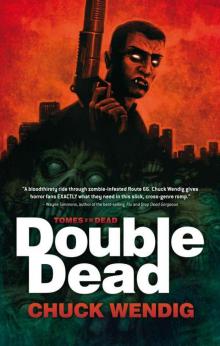 Double Dead
Double Dead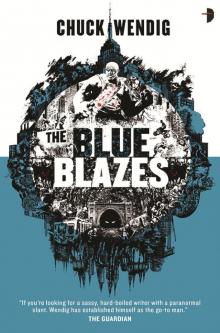 The Blue Blazes
The Blue Blazes 250 Things You Should Know About Writing
250 Things You Should Know About Writing Irregular Creatures
Irregular Creatures The Raptor & the Wren
The Raptor & the Wren Aftermath: Star Wars
Aftermath: Star Wars Blackbirds
Blackbirds The Hunt
The Hunt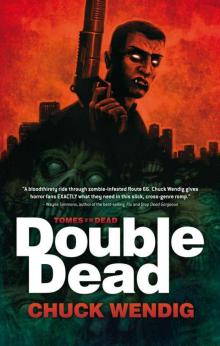 Tomes of the Dead (Book 1): Double Dead
Tomes of the Dead (Book 1): Double Dead Gods and Monsters: Unclean Spirits
Gods and Monsters: Unclean Spirits The Harvest
The Harvest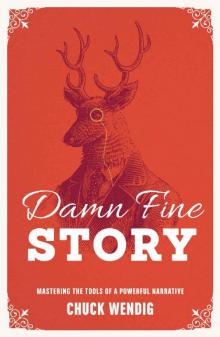 Damn Fine Story: Mastering the Tools of a Powerful Narrative
Damn Fine Story: Mastering the Tools of a Powerful Narrative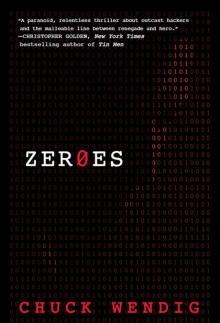 ZerOes
ZerOes Thunderbird
Thunderbird The Hellsblood Bride
The Hellsblood Bride Double Dead: Bad Blood
Double Dead: Bad Blood Life Debt
Life Debt